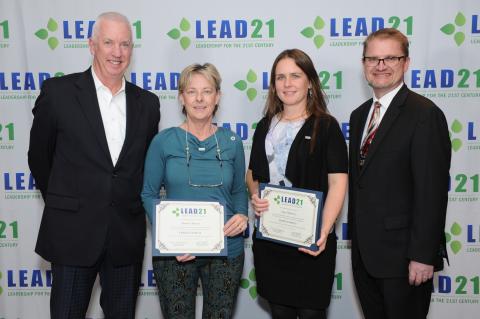
Bonnie Brown, professor of ecological genetics and chair of the Department of Biological Sciences (DBS), and Amy Papineau, team leader for UNH Cooperative Extension's Food & Agriculture programs, were among the 90 professionals from the nation's land-grant system who recently completed the LEAD21 leadership development program.
The primary purpose of LEAD21 is to develop individuals who can effectively lead in an increasingly complex environment, either in their current positions or future leadership positions. During the 12-month program, participants learned how to enhance application of skills and knowledge across a set of nine leadership competencies, to develop a network of peer leaders to enhance personal leadership practice, collaboration and diversity of perspective and to develop and implement an individual’s leadership development process.
“In my view, few leaders in higher education have their primary training in leadership,” says Brown. “Instead, we are called to lead by our colleagues and although they may recognize that we have leadership talent, in many cases it is nascent. Just like a talented young musician needs a gifted teacher to develop her gifts, we need guidance on how to develop our leadership skills. This program provided a safe and introspective environment where we could explore our leadership talents and challenges and craft a plan for continued development.”
Over the course of the past year, participants met regularly with their peers, both in-person and virtually, to enhance personal leadership capacity. The graduation was held at the culmination of the third in-person session, where the focus was on organizational leadership through collaboration, communication and leading change.
“I learned how my own personality characteristics affect my leadership strengths and weaknesses, [and] I learned better ways to recognize hidden talents and value of each of my colleagues and this knowledge helps me to facilitate building more successful collaborations in the process of developing our department,” says Brown when asked about some of the most meaningful takeaways from the experience. “Recognizing all of the changes that DBS and COLSA are undergoing (retirements, hires, Spaulding Biosciences Initiative, a new dean, budget, enrollment), I’m eager to create an environment in my department where risk and innovation are rewarded.”
Mark Ducey, professor and chair of the Department of Natural Resources and the Environment and Estelle Hrabak, associate professor in the Department of Molecular, Cellular, and Biomedical Sciences are also graduates of the program. The COLSA dean’s office nominated and provided funding for Brown, Ducey and Hrabak in support of professional development for the college's faculty members.